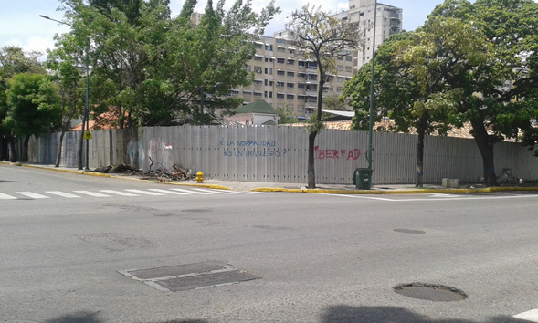 Photo by Pedro Plaza Salvati
Photo by Pedro Plaza SalvatiCaracas
Looking down into the sunken roadway of La Avenida Libertador, I can see a fairly heavy flow of traffic despite the fact that we’re living in a state of quarantine. Before my eyes, the landscape of golf courses stretches to the horizon and the mountains beyond. I’m the only person walking up this long, gently sloping hill. Both sides of the street are lined with several different kinds of trees and palms. White lines divide the traffic lanes and various signs offer warnings: “You are under surveillance.” Every so often, vans with black-tinted windows speed past, flanked by their motorcycle escorts.
I’d been warned against walking alone through this neighbourhood, home to old money families—many of them fallen on hard times—along with the new, younger oligarchy that has replaced the old one in the spheres of power and control. It’s amazing to think that the greenswards of the Caracas Country Club were designed by Frederick Law Olmsted Jr., son of the reputed father of American landscape architecture who designed Central Park in Manhattan and Prospect Park in Brooklyn—two places that occupy an important place in the writings of Paul Auster. Here there are no secret codes to be deciphered, simply the beautiful villas and lush greenery enmeshed in the landscape like in a picture postcard.
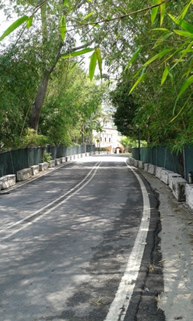
Photo by Pedro Plaza Salvati
I’m walking along Avenida El Estanque, not far from the Humboldt School, near the skirts of the mountain, which marks the beginning of the El Ávila neighborhood. Two SEBIN patrol cars roll by. The steep main avenue sloping downhill leads me to Alta Florida with its many buildings. I keep walking and, on reaching Chapellín, I see National Guard officers standing at a food stall that sells arepas and empanadas. The hoods of several Bolivarian National Police cars are poking out of an auto repair shop. Pausing on a bridge and looking toward the horizon, I see an extensive thicket of small houses and shanties crammed together and, far in the distance, the mountains on the far side of Caracas. They resemble the gentle silhouette of the volcanoes and mountains that form the San José Valley in Costa Rica.
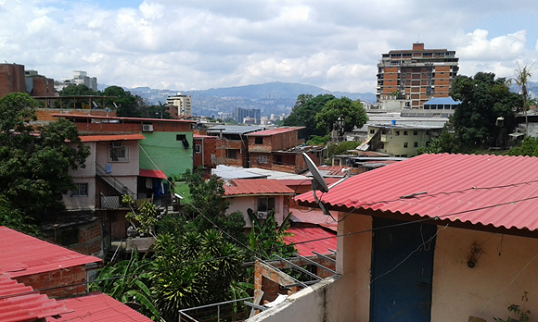
Photo by Pedro Plaza Salvati
Chapellín is a populous traditional neighborhood, but, at the same time, the news is thick with reports about the violence there. It has a powerful effect on the imagination. I walk along peacefully, unbothered, as if I had walked through here a thousand times, suppressing the fluttering butterflies in my stomach. The transition from Country Club to El Ávila to Alta Florida to Chapellín is a dramatic one, and I come out on Calle Los Mangos de la Florida. This street has a dangerous reputation. There are a number of half-finished buildings under construction that have been taken over by squatters, their walls tagged with slogans: “Colectivo Chapellín,” “Comuna Villa Franca,” and “Poder Popular.” The Chapellín Collective defines itself as “active, grassroots members fighting for death to the Revolution.”
I see a small church that looks like the ones in Catalonia. The outside wall of the Mansión del Country deli and bakery sports a ceramic relief depicting bakers working at their ovens, superscribed with the name of the building that houses the bakery: “Quinta Montserrat.” I reach Juan Bautista Arismendi Avenue, busy with traffic.
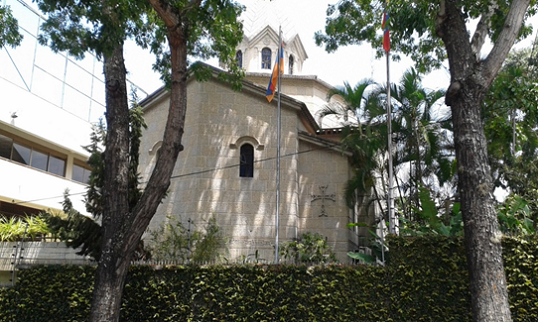
Photo by Pedro Plaza Salvati
Some graffiti makes me laugh: “Anti-Majunche Commando.” As many people know, majunche was the derogatory term Hugo Chávez’s 2012 campaign tried to hang on his opponent, Henrique “majunche” Capriles. A majunche—a shabby, third-rate person—doesn’t win elections. For this reason, the late president used it to designate an anti-coup commando. Chávez infamously populated the Venezuelan linguistic imagination with expressions intended to stigmatize his enemies.
I see National Police, National Guard officers, and Liberation Police all clustered together in a modern-day, real-life dystopia. I reach the corner where the church of La Chiquinquirá stands. I snap a photograph capturing the downhill view along Los Jabillos Avenue: brick walls on the right-hand side, trees lining the left-hand sidewalk, the shadows of their boughs sketched upon the pavement.
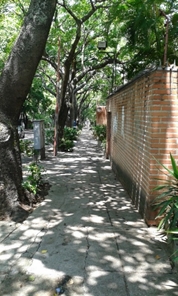
Photo by Pedro Plaza Salvati
I walk along Festejos Mar and pass the Valles Funeral Home. Merriment and death on the very same street. I have read about many cases, in different countries, where people have contracted COVID-19 at funerals. It must be really difficult to maintain social distancing when caught between sorrow and emotion, trying to say something like “I’m very sorry about Felipe’s death,” from behind a face mask. “My sincerest condolences,” from six feet away. I reach La Avenida Libertador, taking in several prominent brick buildings, including those of the Misión Vivienda, with Hugo Chávez’s gigantic signature on one side, and hundreds of DIRECTV antennas in the windows.
I find myself thinking for a moment about Krina Ber’s excellent piece chronicling the rough stories about this street, all the mishaps and lurid encounters people have endured. Of course, my memory contains scenes from several years ago: a nighttime stroll along the avenue revealed sex for sale and wild behavior with lots of violence and fighting. I also remember the failed demonstrations, when thousands of us marched together to stage protests at Miraflores Palace.
I remember how much tear gas we inhaled on this avenue, so many times, like on that one Friday—February 27, 2004. After months of work, the opposition had gathered three million four-hundred thousand signatures demanding a referendum to revoke the mandate of Hugo Chávez. That same week the National Election Council announced that it would have to check the authenticity of one million five-hundred thousand signatures, a clear insinuation that they were illegitimate. The decision was announced by the president of the electoral committee, Jorge Rodríguez, the same person who now announces the steps that must be taken against the pandemic and who seemed likely, at any moment, to appear on the enigmatic and outdated balcony of the NEC building. The opposition was fired up by the news, unleashing a pitched battle that lasted hours in the very spot where I was now crossing the street.
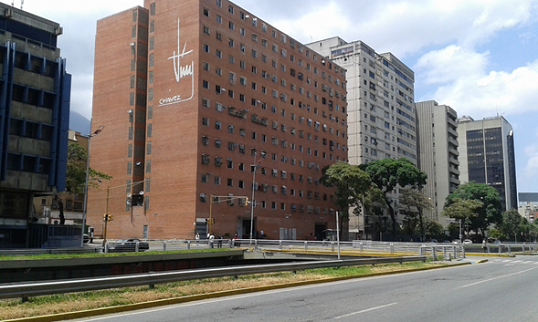
Photo by Pedro Plaza Salvati
Following the avenue, I turn onto various side streets, among them Las Flores. I see young men carrying the tricolor haversack so often spotted on the Caracas landscape. They are searching for food or just wandering around. Their faces look hard and suspicious but soften when they realize someone is making eye contact with them. A friend in the security sector taught me that trick several years ago: if someone seems suspicious, look them straight in the eyes so that they feel that their intentions have been discovered.
In a small plaza, I come across a bust of Rafael Arévalo González that bears the inscription “Martyr to Civility.” As a journalist, Arévalo González challenged the tyranny of Juan Vicente Gómez. For this he was jailed in La Rotunda prison from 1913 to 1922. All told, he spent twenty-seven years incarcerated in different prisons. One humorous remark suggests that his second profession was being a political prisoner. Those who knew him affirmed that he always kept a suitcase packed and ready to go, bearing a label that read: “Rafael Arévalo: La Rotunda.”
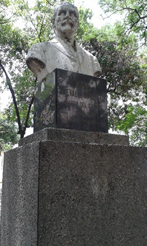
Photo by Pedro Plaza Salvati
I’m approaching PDVSA, Petroleum of Venezuela, the state-controlled oil monopoly. I pass through a small neighborhood with a few individual houses. A wall enclosing several dwellings bears the following graffiti: “Entering Chávez Territory.” More and more often, I see new buildings from the Misión Vivienda containing small markets on the ground floors. They remind me a lot of the little country stores out on the plains, in San Francisco de Tiznados where my father used to take us. As a teenager I learned to hunt the rabbits, peccaries, and deer that we always smuggled through the police checkpoints to eat. Eventually, I couldn’t handle the guilt anymore and I stopped hunting animals. That bodega on the ground floor of the Misión Vivienda seems a complete contrast to daily life in Caracas.
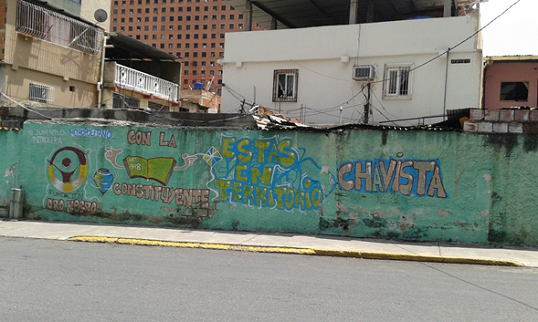
Photo by Pedro Plaza Salvati
On the main street of El Bosque, I walk along the side where the Superintendent of Fair Prices (SUNDE) is located. The wall above the entrance is painted with a mural of a gigantic red paratrooper’s beret bearing the slogan, also scrawled in enormous letters: “Aquí no se habla mal de Chávez”—We Don’t Insult Chávez Here. I’d also read the same slogan at the Maiquetía Airport and in various official locations, as well as at the entrance to the Venezolana de Televisión Canal, the emblematic face of the state-run television monopoly which controls many stations. Clearly, the State is not a government: that same slogan—that no one may criticize Chávez—appeared in Los Ruices, which experienced a significant outbreak of COVID-19 among those who do not speak badly of Chávez, on VTV, a television channel that permits no dissidence whatsoever nor any contrary opinions. No unfair criticisms of Putin here; no denigrating Lukashenko around here, alive or dead; here no one speaks ill of Castro; here no one besmirches the name of Chávez.
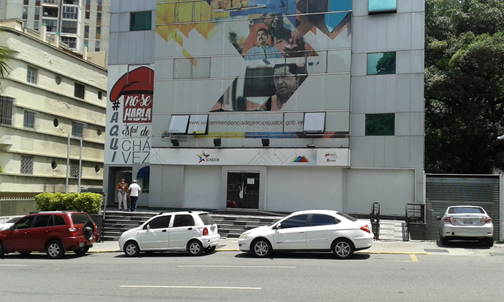
Photo by Pedro Plaza Salvati
I cross Chacaíto and walk along Chacao. I go into a market inside the Centro Lido to buy something to drink. There I notice several Russians, less cautious, apparently, because they’re not wearing face masks.
The items for sale in that market are priced in dollars. A Burger King on the same floor is open but only for takeout. One of the employees is sitting at an outdoor table facing Francisco de Miranda Avenue; he’s dressed in the company uniform and wearing a king’s crown. A crown—una corona—during the coronavirus pandemic. He seems unaware of the irony.
FAES soldiers are stationed at the entrance of the Lido Hotel. I’m on the sidewalk and their energy and uniforms and rifles intimidate me. The place is full of black vans with dark-tinted windows, like the ones that drove past me when I was walking along the main street in the Country Club. I don’t dare stare at them. Submission is one of the stigmas of having to live in political systems like Venezuela’s.
I head down toward El Rosal, and on the street outside of a white modern building, I find a letter from the Russian state-controlled oil company Rosneft, which left the country despite being from an ally nation. In the letter, Mikhail Hrafinin, the Rosneft representative in Venezuela, congratulates one Alexy for his excellent performance in 2015 and awards him a personal bonus of $2,000.
The sidewalks and streets are littered not only with lost papers but also with discarded gloves and face masks, abandoned like deactivated antipersonnel mines. The governor of New York, Andrew Cuomo, declared respirators to be as crucial to victory as missiles were in World War II. Face masks, gloves, and hand sanitizer strike me as the weapons in this war that we are fighting. I walk the streets of El Rosal one by one, horizontally and vertically. Now the solitude is almost complete. The neighborhood is quite reminiscent of some areas of Bogotá. The buildings, the sidewalks, the trees. I walk back toward Francisco de Miranda Avenue. In front of a house, I find some movie posters for The Unbearable Lightness of Being and Charlie Chaplin’s P. for Police, along with a copy of Picasso’s The Madman. So many stories in the trash!
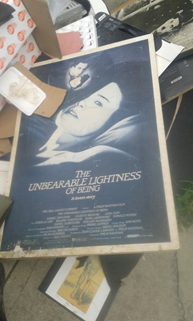
Photo by Pedro Plaza Salvati
Along Francisco de Miranda I see a woman who looks quite disheveled. I figure she must be homeless. She runs to find cover behind a street sign. She whips down her pants. I don’t want to look, but everyone is watching her. She squats down and pees. In Caracas, it’s difficult to find bathrooms if you really have to go. ¡Resistid valientes vejigas!—Resist, you valiant bladders!
Nearby, a man is seated on a bench with four children, presumably his. They are all eating mangoes, laughing, and joking. The family is in a good mood. Perhaps that was their lunch or their only meal of the day. I encounter a blind man in the middle of the street with his face mask on. Darkness within the darkness we are living through, he finds his way with his cane, or perhaps he knows his path by heart. A few weeks ago (or was it months?), Andrea Bocelli gave a solo concert inside the empty Cathedral of Milan. The drama inside the drama.
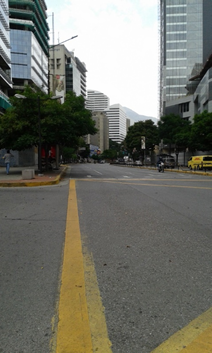
Photo by Pedro Plaza Salvati
A Chacao Police bus is parked and blocking the street at the Torre Britannica. I take a detour toward La Floresta and discover a park. It’s called Parque Aruflo. It’s a rectangular park. A plaque reads: “In 1959, following the fall of the dictatorship, the euphoria of liberty was accompanied by a gamut of social problems needing to be solved. The invasion of green areas by the needy classes was one of them. The community of La Floresta joined together to defend this area, giving rise to the first of the neighborhood associations in Venezuela: Aruflo, which today, together with the city hall of Sucre District, re-inaugurates this park for the enjoyment of the citizens. Chacao, October 1985.”
At the entrance to a building called Petunia, at the Transversal 1 of Los Palos Grandes, hangs a handwritten sign: “Of all the things you carry with you, your attitude is the most important one. LPG, 91 years old.” On another building called Lassie, this time hanging from the station railings, a paper sign says: “Anyone interested in adopting the cats from this building, call 0212-3178989.” One building named for a flower, offering free civic advice, another building named after a dog giving away cats for adoption.
I walk toward the pavement of Centro Plaza and see two young girls and a boy leave Automercados with a large number of shopping bags. Alongside the Budare arepa stand, I see a gangly-looking guy with a crooked neck. He stands there staring at a woman passing by, slips his hand into his open zipper, and starts masturbating. The sight turns my stomach. The man sees me, immediately removes his hand from his pants and keeps on walking, avoiding my eyes, trying to act naturally. In the Plaza Bélgica, I see a pair of lovers kissing, lost to the world. Behind them a sign hangs from a public building: “When tyranny is law, revolution is order.”
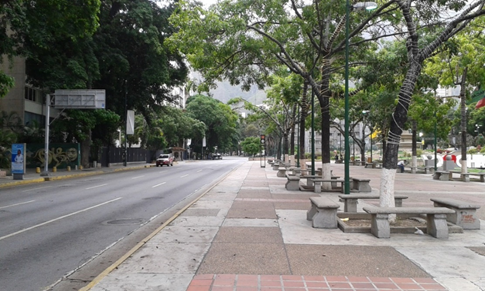
Photo by Pedro Plaza Salvati
I’m in the center of Chacao. A cyclist rides past me with a sign that says “Ayuda Humanitaria Biciarepazo”—Arepa-Cycle Humanitarian Assistance. By coincidence, I pass by the front of the San José church. I hear singing and find myself drawn to an amazing and moving scene: a Mass is being celebrated on the church steps. The priest and his acolyte are there, the smell of incense is in the air, people are kneeling on the sidewalk in front of the church and on the other side of the street, despite the cars passing between them. I get goosebumps and even felt like crying. Coronavirus Mass.
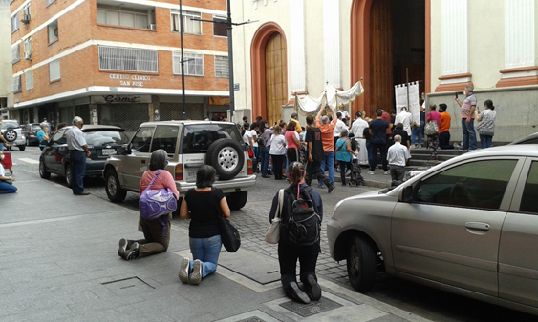
Photo by Pedro Plaza Salvati
There’s a young street vendor walking through Chacao selling protective face shields. He’s wearing one himself and carrying two more on each arm, and he’s dressed in black. He looks like an anti-riot vulture. My mystical reverie from the street Mass is cut short. He tells me that he’s the distributor of the face shields, and he’ll let me have them for three dollars, that I can pay cash or use Zelle. Casual economy with payment from an account in the United States. Fooey. At a bakery I witness an argument between the cashier and a policeman, who instructs him to put on gloves. The man answers him: “Who’s more contagious: you coming in off the street or me?”
I think about that last defiant question. I’m exhausted. After a while I arrive back home and find, like every other day, the little disinfection station at the entrance. It’s starting to look messy, like soldiers’ trenches or the places where they sleep during a war. They keep their weapons and combat gear close at hand, but they become careless, without any end in sight, confident that those weapons will help save them when things get really rough.
